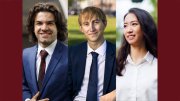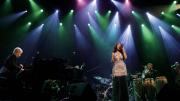Every year, three student speakers address the Commencement crowd in Tercentenary Theatre: the student “parts” that are an essential feature of Harvard’s graduation traditions. Here Harvard Magazine profiles the honored student speakers at the 374th Commencement, this Thursday, May 29. Each student excelled during the competitions for their respective parts, which are judged on presentation and contents. And each will address the enormous crowd speaking from memory.
Aidan Robert Scully ’25, Latin Salutatorian
The classics education of Aidan Robert Scully ’25 started early, when his father, Christopher Scully ’94, read him The Aeneid for Boys and Girls as a bedtime story. When Aidan started high school, his father—a Latin teacher—said he could take any language he wanted “as long as it was Latin.” And when Aidan got into Harvard, he started dreaming of delivering the Latin commencement speech; his dad gave the address in 1994, laden with references to Seinfeld, the quirks of Harvard class schedules, and Bill and Hillary Clintons’ Whitewater scandal.
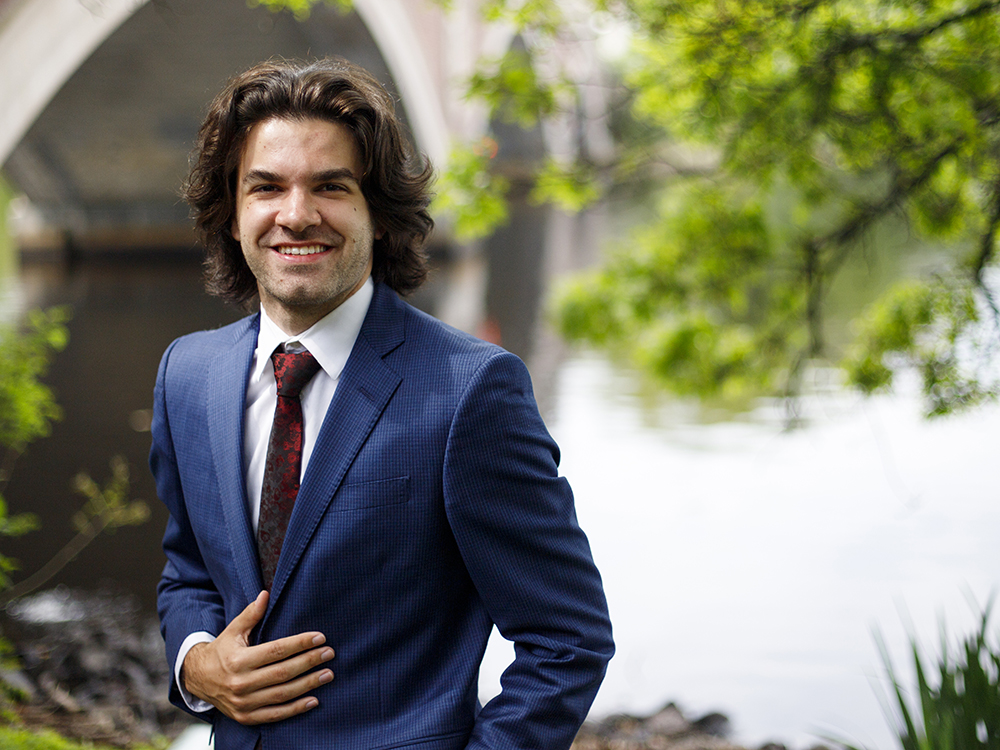
In Taunton, Massachusetts, Scully grew up Unitarian Universalist (UU), a non-creedal faith that emphasizes core values instead of shared doctrine. (His parents, who were in a theater troupe, chose to raise Scully as UU after performing at a local church several times.) When Scully came to Harvard, he did not find a UU community and so leaned into interfaith organizing, which he considered the next best thing. His sophomore year, he helped launch the Harvard Undergraduate Queer Interfaith Community. Scully says that the group, which hosts social and educational events, is trying to dispel the notion that “if you are queer and religious, your religious practice is inherently less devout, that you somehow need to sacrifice a commitment to certain aspects of your religious tradition just because of who you are.” During his junior year and senior fall, Scully interned for Americans United for Separation of Church and State, lobbying to narrow the “ministerial exemption,” which allows religious organizations to bypass federal employment laws.
Scully brought his interest in religion into the classroom, taking courses at the intersection of religion and classics. He studied Christian Latin at the Divinity School, analyzed Roman historian Livy’s construction of racial and ethnic categories, and penned a senior thesis about two fifth-century Roman historians who argued that Roman history was inevitably building toward Christianization (and that the new faith could not be blamed for Rome’s decline).
After graduation, Scully will head to Cambridge University for a master of philosophy degree in theology, religion, and the philosophy of religion. Then he hopes to seek a Ph.D. in religion or classics before becoming a professor or high school teacher. He wants to serve as a public-facing educator, dispelling the notion that ancient Rome was a “hyper-masculine, proto-white ethno-state, which is absolutely wrong, not only morally, but also historiographically.” He explains, “I understand my activism and my scholarship as operating in the same realm.”
In his speech, “De Haereditatibus Peregrinis” (“Regarding Foreign Inheritances”), Scully wants to highlight what he calls all of the “foreign” languages at Harvard. “Some of us speak the language of history, others the language of science,” he says. As a college education goes on, “there are a decreasing number of opportunities to engage with people who are studying something radically different from you.” He continues, “The fact that we are all sort of thinking in these different ways and seeing the world in different ways is really our greatest strength.” Though most listeners will not pick up on the nuances of his speech—his inclusion of Latin’s longest word and references to Cicero and Virgil—one particular attendee will surely be marveling at his construction.
Thor Reimann ’25, Senior English Orator
In January, Thor Reimann ’25 stood on the balcony of the Minnesota State Capitol dressed as a giant gar fish. Though it might seem odd, Reimann—who, at six feet five inches, is about the height of an average alligator gar—tied many of his interests together through that fish costume. He was at the Capitol supporting Friends of the Boundary Waters Wilderness, a nonprofit seeking to preserve a million-acre park where his family camps every summer. At Harvard, Reimann studies environmental conservation. And he is unafraid to be silly in public.
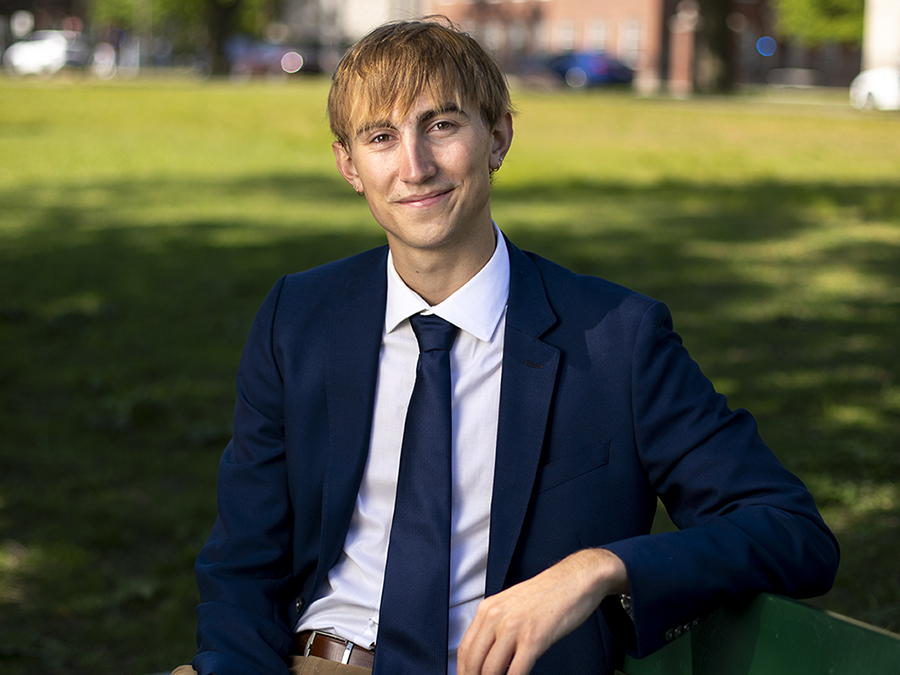
Reimann grew up in Apple Valley, Minnesota, on the outer ring of the Minneapolis-St. Paul suburbs. The youngest of three siblings, Reimann filled his time in high school with band practice (he was the drum major) and speech competitions (he competed in the national finals for “duo interpretation,” where he and a partner performed 10 minutes of the play Ugly Lies the Bone by Lindsey Ferrentino). At Harvard, Reimann focused on the first-year experience, leading three trips for the First-Year Outdoor Program, hosting the first-year dance through the Crimson Key Society, and mentoring first-years as a peer advising fellow.
A dual concentrator who combined comparative study of religion with environmental studies and public policy, Reimann is interested in the religious implications of climate change. “I think that climate change poses such an existential threat to humanity,” he says, “that turning to spirituality can be a really compelling way of dealing with a lot of those tough feelings.” For his senior thesis, he analyzed contested land ownership claims connected to the Bear Ears National Monument in Utah, researching how the government reconciled the overlapping interests of Indigenous tribes and local members of the Church of Jesus Christ of Latter-Day Saints, who both consider the land sacred.
Reimann came up with the concept for his graduation speech during his first-year literature course, Humanities 10. The class read an Emily Dickinson poem, “This World is not Conclusion,” and he was totally mesmerized. “The gist of the poem is you don’t really know what's coming next, but something’s out there,” he says. He memorized the poem—the first and only time he’s done that—and already knew he wanted to write a graduation speech centered on the text. Now, he wants to share its message with the Harvard community. “Ostensibly, the poem on its face is probably about death,” he says. But for this context, Reimann prefers to think of the conclusion as Commencement.
Yurong “Luanna” Jiang, M.P.A. ’25, Graduate Orator
Last summer, Yurong “Luanna” Jiang, M.P.A. ’25, was working in the office of the prime minister of Mongolia alongside an Indonesian international student and a Korean-American student. One evening, she received a call from a couple of Harvard Kennedy School (HKS) friends—one Indian-American, one Thai—working in Tanzania. Jiang’s friends were staring at a washing machine whose text was in Chinese. Could Jiang, who grew up in Qingdao, China, translate for them? “That story has, like, eight countries embedded in it,” says Jiang. “It’s a great moment that embodies the idea of international development,” the focus of her graduate studies.
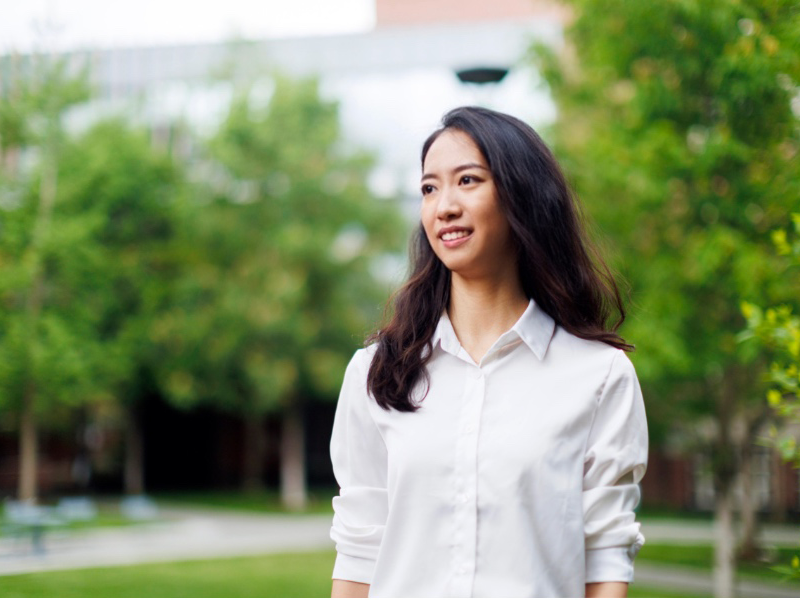
Jiang’s path to HKS began in middle school, when she developed an interest in economics. Her high school in China did not offer a robust economics curriculum, so she spent two years at Cardiff Sixth Form College in Wales, United Kingdom. As an undergraduate at Duke University, she studied economics and politics. She was initially interested in pursuing an economics Ph.D. but instead moved to the Bay Area to work as a junior economist for Credit Suisse. Logging 80-hour weeks, she says, helps “you grow and learn twice as fast.” After three years there and one year at a small private equity firm, she came to HKS, interested in alleviating global poverty and improving women’s rights.
At Harvard, Jiang quickly became a community builder. She cross-listed at MIT in the fall of 2024 to take a startup class in their Media Lab, which gave her access to MIT’s sailing pavilion; now, she and her boyfriend take classmates out on the Charles. “On the boat, the only thing you can do is talk to each other,” she says. “It’s a wonderful bonding experience.” Jiang also started a boxing club. She picked up the sport when she was young and “a little bit reckless.” At Harvard, she taught people to spar, punch without blinking, and hit hard. The friends she made at HKS helped her find her postgraduate job at an LA-based private credit startup.
Though interested in international development, Jiang also explored other fields at Harvard. She took a public speaking course in the Graduate School of Education and enrolled in a philosophy seminar with Adams professor of political leadership and democratic values Arthur Applbaum. Now, Applbaum hosts a two-hour private tutorial for her, which she says will continue informally after she leaves Cambridge. Jiang’s parents are unable to attend graduation, so Applbaum will take their place in the front-row seats that had been reserved from them.
When Jiang sat down to write her speech, U.S. President Donald Trump was threatening to revoke Harvard’s ability to host international students, and some students were having their visas revoked. She felt a “moral responsibility” to share a message of “common humanity,” she says. Jiang hopes that her speech, “Our Humanity,” will show that “humanity rises and falls together.” She continues, “In a very divided world, we should refuse to demonize those we disagree with and learn to see the human in them.”
